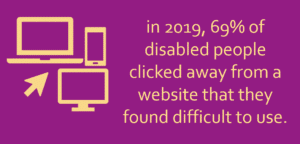Information Hub
Click Away Pound
How difficult does your business make it for me to spend my money with you?

And if your website is not accessible, not only are you losing income, you may be contravening the Equality Act (2010), which requires organisations to make ‘reasonable adjustments’ so their websites are as accessible as possible. As businesses, charities and social enterprises come to terms with the impact of corona-virus in 2020, it is vital the changes include a better awareness of accessibility – and how this can help a business grow in the future. The good news is that most websites can be made more accessible with simple tweaks and better planning – see our resource article “Making your website accessible” where you will find practical advice and guidance.
The Click-Away Pound is a report by consultants Freeny Williams, who specialise in assessing websites for accessibility and usability. Originally published in 2016, the report highlighted how web accessibility is directly linked to an organisation’s bottom line. The latest report (updated in February 2020) finds very little has changed and there are still too many on-line shopping sites with accessibility issues. The report’s data is based on research by WebAIM (specialists in accessible design and development) who reviewed the home pages of the top one million websites across the world (21,733 were UK websites) in February 2020 for accessibility using their automated software. Sadly the result is dismal: 97.8% of home pages exhibited failures against the Web Content Accessibility Guidelines (WCAG2) accessibility standards.
Scale of the Click-Away Pound in 2019
We have included links to the original reports at the end, but here are the summary findings about why and how over £17 billion of potential sales is still being lost.

Key findings of the 2019 report:
- Out of a UK population of 66.44 million (in 2018), there are 48.13 million UK adults (over 16 years old) who have internet access.
- There are 10.07 million disabled adults who are internet users, with 7.15 million having access needs.
- The online spending power of people with access needs is now £24.8 billion – which is 14.9% of the UK’s total on-line spend of £166.6 billion.
- The average annual online spend of people with access needs is £3,460.
- Disabled people with access needs who say they ‘click away’ from a site with barriers is 69% – this is 4.3 million potential customers being lost.
- 75% of users with access needs felt accessibility was more important than price when making spending decisions.
- 83% of users with access needs limit their shopping to sites they know are barrier-free.
- Only 8% of users with access needs contacted the site owner about the barriers they had experienced.
Impact of Smartphones
Smartphones are now the preferred device for accessing the internet. In 2008 17% of the UK population owned an Android or iPhone. Ten years on, Ofcom reported smartphone ownership had reached 78% (95% for 16-24 year olds). In 2019, finder.com reported 20% on online time is spent on social media.
The Click-Away report found that 63% of the survey participants use a form of Assistive Technology (AT), noting that this may be partly due to the use of smart phones which have inbuilt assistive technology (eg screen reader, magnification, speech recognition). Amongst UK assistive technology users, the preference for smartphones has risen from 9% to 35%. This growth is driven partly by the accessibility features built into the market-dominating iOS and Android operating systems, and partly by mobile apps being used more frequently for common online tasks. But the accessibility of such apps is still a cause for concern.
Key barriers for users with access needs
The Click-Away report highlights the most common issues and barriers that disabled people still find when using the internet:
- Pages too crowded (too much content)
- Systems designed to test if a computer user is human, such as reCAPTCHA, can cause problems with assistive technology (for example audio description can compete with screen readers, making the audio impossible to decipher)
- Poor link information /navigation
- Forms not easy to fill in
- Poor colour contrast or text layout
- Distracting moving images and graphics
- Poor keyboard access
- Poor screen-reader access
Accessing the Click-Away Pound report. The two versions (2016 and 2019) are available to download in Microsoft Word and Adobe pdf (portable document format) versions from the Click-Away Pound website:
- Go to this page to download the 2016 Click-Away Pound Final Report
- Go to this page to download the 2019 Click-Away Pound Final Report
For further information please contact the project team either via our on-line form or call us on 01392 241124
Please note: We are not responsible for the contents or reliability of linked websites and do not necessarily endorse the views expressed within them. Listing shall not be taken as endorsement of any kind. We cannot guarantee that these links will work all of the time and we have no control over availability of the linked pages.
We do not object to you linking directly to the information that is hosted on this website and you do not need permission to do so.